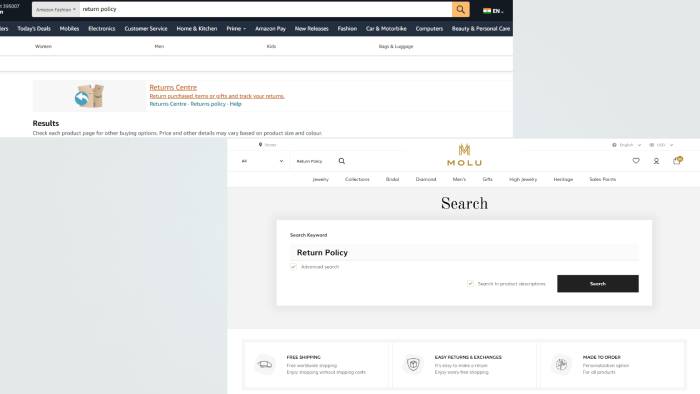Enjoyed this post?
Be sure to subscribe to the nopAccelerate newsletter and get regular updates about awesome posts just like this one and more!
Let’s face it—search is the heart of any e-commerce site. In today’s competitive online marketplace, having a smart, efficient search functionality isn’t just a nice-to-have; it’s what makes or breaks the customer experience. In our previous blog, we discussed how 41% of e-commerce sites are still getting their search wrong, leading to missed revenue and frustrated customers. Whether users are searching for specific products or browsing product categories, they expect seamless, fast, and relevant search results.
We talked about the 8 essential e-commerce search queries that form the backbone of a successful online store’s search experience. Now, it’s time to dive deeper into all those e-commerce search query types to understand their importance, the common pitfalls sites face, and how you can optimize them to ensure a smooth and satisfying customer journey.
Exact searches occur when users know exactly what they want. These searches typically involve specific product names, models, or SKUs (e.g., “iPhone 14 Pro” or “STH2000DM004”). The intent here is clear: the user is already well-informed and looking for the exact product and is more likely to make a purchase when it is found.
Why It Matters: Users conducting exact searches are highly valuable because they are often at the final stage of their purchasing journey. They’ve done their research and are now ready to buy. If your site fails to return precise results for these searches, you risk losing a sale to a competitor who can deliver what the customer is looking for.
Let’s see if I can search my model number… Yes, there it is—so good!” This participant appreciated being able to search by SKU (model number) on hoober.com.Providing SKU-based search ensures users can quickly find the exact model they’re looking for, enhancing their overall shopping experience.
Let’s search with mobile model name… Yes, it shows the result! When users search with the (full text query) exact model name, they get accurate results. The tokenization and search features work seamlessly on amazon.com, making it easy for users to quickly find the same product they’re looking for.
Product type searches involve users searching by a general product category, such as “women’s sneakers” or “laptops.” These users may not have a specific product in mind but are exploring a range of options.
Why It Matters: Product-type searches are often the starting point for users who are still in the decision-making process. Relevant search results that are offered in a well-organized and easily navigable way help guide users to the right products quickly, building trust and encouraging exploration.
Etsy Website has advance search features, like “Product Type Search” make exploring easier. For example, if someone’s browsing laptops without a specific choice in mind, helpful filters guide them to options they’ll love—boosting chances of a purchase.
Feature searches occur when users look for products with specific attributes or characteristics, such as “waterproof jacket” or “Bluetooth headphones.” They know the product type but want a specific feature.
Why It Matters: Supporting feature searches ensures that users with specific needs can find the products that match their criteria. If users can’t filter or search by the features they want, they’re likely to leave the site and look elsewhere.
Panache Kids website offers an intuitive search experience with “feature-based queries” and advanced filter options. Visitors can easily select specific categories and attributes, ensuring their search queries deliver relevant results tailored to their needs.
Use case searches happen when users are looking for a product to fulfill a specific need or occasion, such as “travel backpack” or “birthday gift for mom.” These users are focused on the context in which they’ll use the product.
Why It Matters: Use case searches are highly contextual, allowing you to tap into user intent directly. If you can serve results that match these scenarios, you’ll increase the likelihood of engagement and conversion, as users feel you understand their needs.
Websites like H&M, which sell clothing, are among the most popular brands. However, when searching with a use case like ‘Birthday Dress for Mom,’ their search functionality often fails. On the other hand, websites like alwaysfashion.com provide relevant results, showcasing the effectiveness of their search functionality. These websites utilize readily available plugins to ensure visitors get accurate and relevant results.
Abbreviation and symbol searches occur when users input shortened forms or symbols instead of full product names (e.g., “26 in trolley bag” instead of “26 inch trolley bag”). As mobile shopping continues to grow, users prefer these shorter inputs to save time and effort.
Why It Matters: In the dynamic world of e-commerce, efficiency is what customers prioritize most. When users search with abbreviations or symbols, they expect results that match their intent quickly. If your search engine cannot interpret these abbreviated terms correctly, users will see irrelevant results or, worse, nothing at all. This frustration can drive them away, possibly to a competitor’s site.
One online store selling bags and luggage fails to support search terms with abbreviations like “in” for “inch,” causing searches to fail and visitors to leave without purchasing. In contrast, other websites effectively handle abbreviations like “ft” for “feet,” ensuring a smoother search experience and better user retention.
As this store supports abbreviations and symbols while also offering “multi-faceted filters” options, visitors can easily refine their searches. Filters like price, hair type, gender, and brands make it simple for users to find exactly what they’re looking for, improving their overall shopping experience.
By accommodating abbreviation and symbol searches, you create a more user-friendly search experience that aligns with modern browsing behavior, particularly on mobile devices.
Compatibility searches are when users look for products that work together, such as “charger for Mac Book Air” or “case for iPhone 14 Pro.” These searches often occur when users are trying to find accessories or add-on for products they already own.
Why They Matter: Customers who conduct compatibility searches are often highly intent-driven, seeking to complete their purchase with additional products. This presents a prime opportunity for cross-selling and up-selling compatible items, boosting overall sales and customer satisfaction.
Amazon continues to lead the way with its smart compatibility searches. Take thefurnituremart website, for example. Sure, they show results, but are they really relevant? Let’s say a visitor searches for ‘Dining chairs for a round table.’ The website should understand that the user likely already owns a round table and is now searching for matching accessories or add-ons.
By optimizing for compatibility searches, you not only help customers find what they need efficiently but also create opportunities for increasing average order value through effective cross-selling strategies.
Symptom searches occur when users look for solutions to specific problems rather than searching for a product by name (e.g., “remedy for dry skin” or “cure for headaches”). These users often describe a need or symptom they want to address, seeking guidance and relevant product options.
Why They Matter: Symptom searches are highly solution-oriented. When users search for solutions rather than products, they are likely in need of assistance and may not know exactly which product suits their needs. Meeting these customers’ needs builds trust and credibility, positioning your brand as a problem solver and increasing the likelihood of conversion.

Both websites sell skincare products, but found that only one supports ‘Symptom Searches.’ What does that mean? It means that having a visually appealing layout and great design isn’t enough to succeed in e-commerce. When users don’t get relevant search results, you fail as an online seller.
Supporting symptom searches effectively can transform your site into a trusted resource, encouraging users to return and explore more products.
Non-product searches involve users seeking information about your site’s policies, services, or other details unrelated to specific products (e.g., “return policy,” “gift wrapping options,” or “shipping information”).
Why They Matter: Non-product searches are crucial for building customer trust. Customers often look for reassurance before making a purchase, and if they can easily find answers to their questions, they are more likely to proceed with their order. Supporting these queries also shows transparency, which can improve brand loyalty.

Searching for “return policy” on Amazon yields “Returns Center” links, along with a short description of the return policy and a set of links to relevant Help sections. On molu.com, a search for “return policy” directs users to the relevant result, where numerous return-related FAQs are available.
By optimizing for non-product searches, you not only enhance the user experience but also build trust and reduce potential friction points in the buying process.
By mastering all eight e-commerce search query types— Exact Searches, Product Type Searches, Feature Searches, Use Case Searches, Abbreviation/Symbol Searches, Compatibility Searches, Symptom Searches, and Non-Product Searches—you ensure your site caters to diverse user needs and intent. Each query type plays a crucial role in the customer journey, from helping users find specific products to solving their problems or answering their questions.
An optimized search experience not only enhances user satisfaction but also drives conversion rates, customer retention, and overall revenue growth. When your search engine delivers fast, accurate, and relevant results, it builds trust and loyalty, encouraging users to return for future purchases.
Stay tuned for more insights and practical strategies to enhance your e-commerce business. Your customers’ search experience is your gateway to revenue—make it exceptional!
Comments are closed.